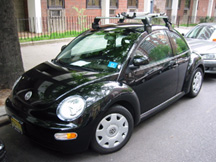I’m working on a project where I can influence the platform used, a rare opportunity. So I’ve been researching some of the current mobile platforms I didn’t know much about…
Ultra-personal computers: OQO is working on a full-powered PC – including Wi-Fi – that will fit in your pocket. Also see IBM’s Meta Pad. Nice when you need all that power and portability, but is that power usable with the small screen? I think we’re seeing computers whose raw performance has outpaced the input/output potential. We need goggles and 3D force-feedback haptic devices to replace our screens and mice.
Tablet PC: a Microsoft-backed platform, basically a laptop with a screen that will fold down and become a touch-sensitive tablet. Considering how low laptop prices could go, this could easily replace the mythical web tablet. But as a PC, will the pen-based computing (itself a moniker of failure) be useful with something other than simplified PDA-like apps?
Mira: Even more likely to become your web tablet, imagine taking your flat screen monitor off its dock and bringing it to another room while it wirelessly communicates with the desktop setup.
And of course there’s Pocket PCs and Palms, which don’t seem as attractive for custom apps due to the limited compatibility with other platforms.
All of the above are non-Apple platforms. Let’s hope the folks in Cupertino have something up their sleeve to follow up the G4 Laptop, they usually do.
